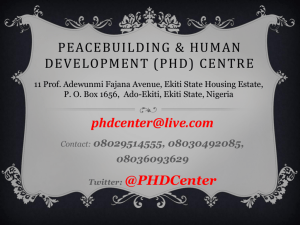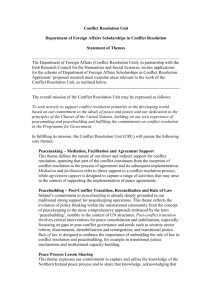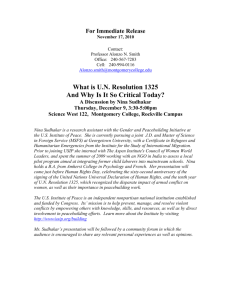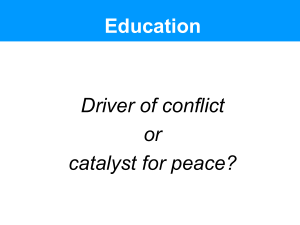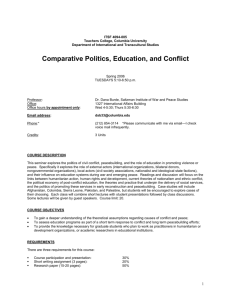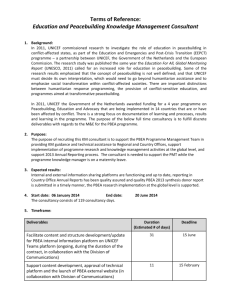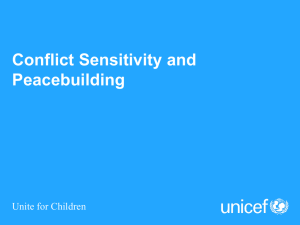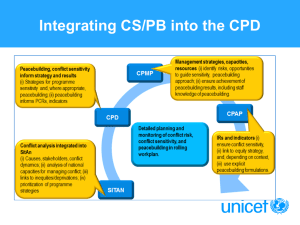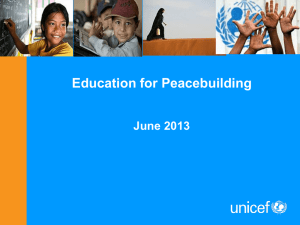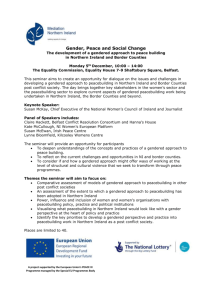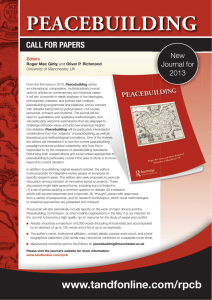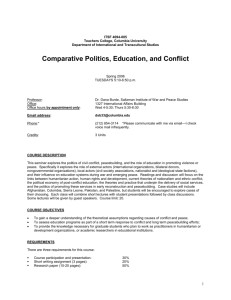Istanbul Conflict Resolution Workshop Introduction
advertisement
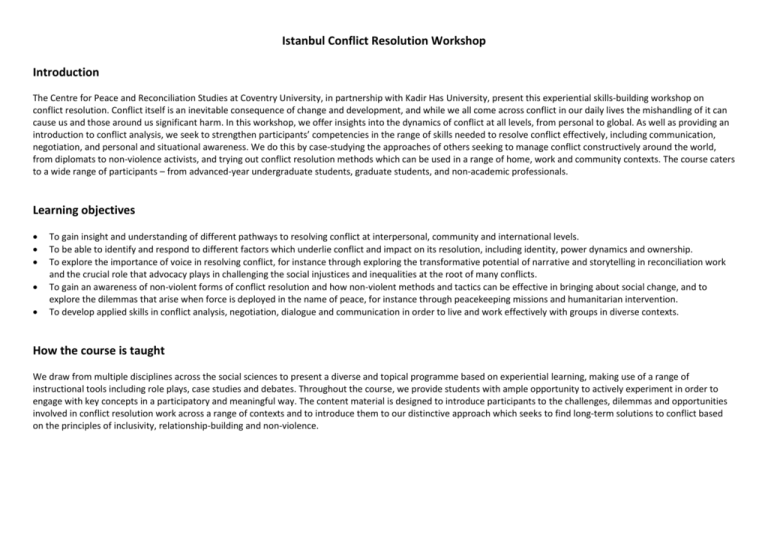
Istanbul Conflict Resolution Workshop Introduction The Centre for Peace and Reconciliation Studies at Coventry University, in partnership with Kadir Has University, present this experiential skills-building workshop on conflict resolution. Conflict itself is an inevitable consequence of change and development, and while we all come across conflict in our daily lives the mishandling of it can cause us and those around us significant harm. In this workshop, we offer insights into the dynamics of conflict at all levels, from personal to global. As well as providing an introduction to conflict analysis, we seek to strengthen participants’ competencies in the range of skills needed to resolve conflict effectively, including communication, negotiation, and personal and situational awareness. We do this by case-studying the approaches of others seeking to manage conflict constructively around the world, from diplomats to non-violence activists, and trying out conflict resolution methods which can be used in a range of home, work and community contexts. The course caters to a wide range of participants – from advanced-year undergraduate students, graduate students, and non-academic professionals. Learning objectives To gain insight and understanding of different pathways to resolving conflict at interpersonal, community and international levels. To be able to identify and respond to different factors which underlie conflict and impact on its resolution, including identity, power dynamics and ownership. To explore the importance of voice in resolving conflict, for instance through exploring the transformative potential of narrative and storytelling in reconciliation work and the crucial role that advocacy plays in challenging the social injustices and inequalities at the root of many conflicts. To gain an awareness of non-violent forms of conflict resolution and how non-violent methods and tactics can be effective in bringing about social change, and to explore the dilemmas that arise when force is deployed in the name of peace, for instance through peacekeeping missions and humanitarian intervention. To develop applied skills in conflict analysis, negotiation, dialogue and communication in order to live and work effectively with groups in diverse contexts. How the course is taught We draw from multiple disciplines across the social sciences to present a diverse and topical programme based on experiential learning, making use of a range of instructional tools including role plays, case studies and debates. Throughout the course, we provide students with ample opportunity to actively experiment in order to engage with key concepts in a participatory and meaningful way. The content material is designed to introduce participants to the challenges, dilemmas and opportunities involved in conflict resolution work across a range of contexts and to introduce them to our distinctive approach which seeks to find long-term solutions to conflict based on the principles of inclusivity, relationship-building and non-violence. Session 1 Monday Tuesday Session 2 Conceptualising conflict A contextual understanding of conflict and peace at global, community and interpersonal levels. Introduction to key conflict theory and its application. Deconstructing identity and power. Working through issues in conflict resolution Working at multiple levels. Peace vs. Justice Inclusion of all voices? Making use of advocacy Speaking out about injustices and making the case for change. Wednesday Thursday Friday Non-violent action for change A case study of non-violence movements and their successes. Linking top down and bottom up approaches (Part 1) Conflict management & peacekeeping. Civil-military cooperation. Intervention and statebuilding. Upper-level peace processes and conflict resolution. Linking top down and bottom up approaches (Part 2) Traditional, indigenous, informal conflict resolution. Community-based peacebuilding and conflict resolution. Conflict resolution between upper levels and the grassroots in the quest for local ownership. Story-telling and dialogue Principles of story-telling; how and why it works. Trying out new methods. Explorations in conflict resolution (Part 1) Debate on violence and role of military. Role-plays exploring community conflict. Session 3 Session 4 Conflict analysis Indentifying power-holders. Dealing with powerful people and interests in daily life. Understanding your conflict and who’s involved. Who’s in and who’s out of the discussions? Exploring ethnicity, culture, age, gender and other conflict markers. The practice of resolving conflict Together exploring options for conflict resolution. Together developing tools for conflict resolution. Together applying knowledge of conflict resolution to case studies. Special focus on non-violent social movements as agents of change April 6th youth movement (Arab Spring) and OTPOR (Serbia). Non-conventional actors and approaches to peacebuilding. Documentary screening. Principles of negotiation, mediation, and other methods. Characteristics of a mediator. The importance of consent, trust and long-term engagement Models of mediation explained. Explorations in conflict resolution (Part 2) Discussion groups. Practice sessions for various tools. Reflections Conclusions. Moving forward. Wrapping up. Workshop Facilitators Professor Alpaslan Özerdem is Chair in Peacebuilding and Director of the Centre for Peace and Reconciliation Studies (CPRS) at Coventry University in the UK. Professor Özerdem holds 17 years’ experience in peace and conflict studies in a wide range of environments. He is an internationally recognised expert, and has published numerous books and papers on peacebuilding, conflict transformation and post-conflict reconstruction. He leads partnerships with various organisations across Europe and has undertaken applied research and consultancy for numerous international agencies, and is a native Turkish speaker. Professor Özerdem has worked in a number of conflict affected environments such as Afghanistan, Bosnia-Herzegovina, El Salvador, Kosovo, Lebanon, Liberia, Philippines, Sierra Leone, Sri Lanka and Turkey. Laura Payne is Senior Research Assistant at the Centre for Peace and Reconciliation Studies (CPRS) at Coventry University in the UK. Ms. Payne has particular expertise in working with peacebuilding actors from non-academic and non-expert backgrounds working on the front lines of conflict in their communities, including extensive experience working with local civil society groups in Africa and Asia. She has previously run workshops across a broad range of conflict contexts to share skills in conflict resolution and peacebuilding practice. Her field experience includes applied research in Turkey, Israel and Palestine, and Iraqi Kurdistan. Close to home, Laura has been involved in initiatives to generate intercultural dialogue and understanding between London-based diaspora youth from cross-border Sudanese communities. Dr. Chuck Thiessen is Research Fellow in Peacebuilding with CPRS at Coventry University. Dr. Thiessen is a scholar and practitioner whose academic research has focused on international peacebuilding and conflict resolution processes in Afghanistan and other war-torn contexts. Previous to his current position Dr. Thiessen worked in Kabul, Afghanistan as a Research Manager for a peacebuilding NGO. He has consulted for several international NGOs in Afghanistan, and has managed a variety of peacebuilding and development projects in Afghanistan and Uzbekistan.
